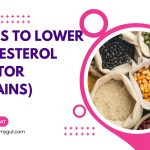7 Hiatal Hernia Weird Symptoms; Gastroenterologist Explains.
Our content is not intended nor recommended as a substitute for medical advice by your doctor. Use for informational purposes only.
What you need to know:
Hiatal hernias can present with weird symptoms due to their complications or due to a large paraesophageal Hiatal hernias. These symptoms may include difficulty swallowing, dyspnea, chest pain, and back pain.
The complete list of weird hiatal hernia symptoms:
- Dysphagia (difficult swallowing).
- Regurgitation of UNDIGESTED food.
- Chest pain radiates to the back.
- Cough, asthma, and shortness of breath.
- Dizziness, easy fatigue, and fast heartbeats (symptoms of anemia).
- Vomiting of blood, passage, or black stools.
Typical symptoms of Hiatal Hernia.
Before we dig into the weird symptoms of the hiatal hernia, you should understand two main ideas:
- The types of Hiatal hernias
- The typical symptoms of hiatal hernia.
Types of hiatal hernia
- The sliding hiatal hernia: Occurs when part of your stomach slides up to the chest through the esophageal opening in the diaphragm. This type typically presents with GERD (acid reflux symptoms). However, many cases have no symptoms at all (reference).
- The paraesophageal hiatal hernia: Another less common type in which part of the fundus of the stomach herniates through the diaphragm into the chest. Vague and atypical symptoms characterize this type.
The typical symptoms of hiatal hernia:
- Most cases of hiatal hernia are asymptomatic (no symptoms at all). This is especially prevalent if the sliding hiatus hernia is small.
GERD symptoms: typical for the sliding type of the hiatus hernia
GERD symptoms include:
* Heartburn: a burning sensation in the front of the chest and the upper middle abdomen.
* Regurgitate bitter (sore) fluid into your throat and mouth.
* Nausea and occasional vomiting.
* Reflux cough, sore throat.
MORE: What Causes a Hiatal Hernia to Flare-up?
Weird Symptoms of hiatal hernia.
1 . Difficulty swallowing (dysphagia).
A sense of blockage or difficulty during swallowing (dysphagia) is one of the weird symptoms of a hiatal hernia.
Dysphagia can be a symptom of any hiatal hernia (both the sliding and the paraesophageal type.
It is often due to partial mechanical obstruction at the junction between your esophagus and stomach.
Dysphagia may not present at the early stages of hiatal hernia. However, call your doctor if you experience new-onset dysphagia. Dysphagia can be a sign of a complicated hiatal hernia.
Examples of hiatal hernia complications leading to dysphagia:
- Gastric volvulus: a twisting and strangulation of the stomach part passing through the diaphragmatic opening (rare complication).
- Fibrosis at the gastroesophageal hernia.
- Development of achalasia (dilated esophagus) due to chronic narrowing of the lower esophageal opening.
Dysphagia is often to solid foods only. Dysphagia to both solids and fluids is a sign of severity.
MORE: 10 Causes of Feeling Like Food Stuck in Chest After Eating.
2. Shortness of breath, cough, asthma.
The protrusion of a large portion of your stomach into the chest cavity can compress your lungs or airways.
Large Hiatal hernias (especially the paraesophageal type) can lead to episodes of shortness of breath.
Dyspnea is usually mild and intermittent and may be related to meals.
However, case reports of severe dyspnea due to hiatal hernia is present but rare (reference).
Cough and asthma.
Cough and asthma are known complications of GERD (acid reflux). Cough and asthma result from regurgitating stomach contents and acid into your respiratory passages.
Patients with Hiatal hernia can develop a weird cough, asthma, and shortness of breath due to the flow of stomach contents during sleep or vomiting into their lungs.
3. Chest pain and back pain.
Hiatal hernia can present with weird sensations or pain in the front of the chest. The pain also radiates to the back in many cases.
Chest pain with a hiatal hernia is often due to inflammations and ulcerations in the lower part of the esophagus or the herniated stomach.
Chest pain is often mild and intermittent, with most cases of hiatal hernia. But severe chest pain mimics myocardial infarction pain.
This study reported a woman who presented to the ER with severe chest pain. Cardiac examination, ECG, and other investigations revealed no heart diseases.
Later, the endoscopy revealed a total hernia with inflammation and erosions in the last part of the esophagus and the gastric fundus, which was the cause of chest pain.
MORE:
- Hiatal Hernia Pain Locations and Characters.
4. Fatigue, Dizziness, Fast Heart Beats (symptoms of anemia).
The parts of the hiatus hernia in your chest quickly get inflamed and ulcerated.
In 1986, Dr. Cameron first described linear (elongated) stomach ulcers associated with large Hiatal hernias. Later, this type of ulcer was named after his name (Cameron lesions) (reference).
Cameron lesions can cause weird symptoms with a Hiatal hernia, such as fatigue, dizziness, fast heartbeats, and shortness of breath.
You can have minor and recurrent needs from the Cameron lesions associated with hiatal hernia over a long period. This spotting has no symptoms in the short term.
Due to the small amount of blood, you will not experience symptoms such as vomiting of blood (hematemesis) or passage of black stool (melena).
In the long term, you will experience weird symptoms such as palpitations, easy fatigue, shortness of breath, and dizziness. These symptoms are due to anemia from bleeding Cameron lesions.
5. Black stool.
Big ulcers can develop in the parts of the esophagus of the stomach that bulges into your chest. When the ulcer is extensive or deep enough, significant bleeding occurs.
The blood in your stomach passes through your intestine and the colon into the stool.
Blood from the bleeding esophageal or stomach ulcers appears black (Black stool or melena).
Moreover, if the bleeding is massive enough, reddish or dark-clotted blood vomiting can also occur.
6. Regurgitation of undigested food.
Regurgitation is common with acid reflux. However, the regurgitation from acid reflux is a bitter or acidic fluid and NOT undigested food.
Regurgitation of undigested food particles can signify partial or complete obstruction of the lower esophageal opening due to a Hiatal hernia.
Call your doctor if regurgitation is associated with other weird symptoms such as dysphagia (difficult swallowing), chest pain, and recurrent vomiting.
This collection of symptoms can be a sign of achalasia (dilated esophagus due to obstruction by Hiatal hernia.
7. Early Satiety & Abdominal pain after eating.
A large part of your stomach gets stuck inside the chest in severe forms of paraesophageal hiatal hernia. As a result, the herniated part doesn’t receive food during eating.
This large hernia leaves a small room for food during and after eating. This will can cause weird symptoms of hiatal hernia, such as:
- Early satiety and inability to complete your meals.
- Sense of fullness after eating.
- Abdominal pain and bloating in the upper-middle stomach after eating very little amounts.
- Constant nausea.
These symptoms are due to para esophageal hernias and don’t occur with the simple sliding hiatal hernia.
When to see a doctor for weird symptoms of a hiatal hernia?
See a doctor if you have one or more of the following:
- Vomiting of blood.
- Passage of black stool.
- Persistent vomiting.
- Persistent difficulty in swallowing (dysphagia).
- Dizziness, palpitations, shortness of breath, and easy fatigue.
- Painful swallowing (odynophagia).
- Severe or persistent cough and asthma.
- Consistent regurgitation of UNDIGESTED food.
- Evidence-based
- Written by a doctor.

Related Posts:
- 7 Effective Hiatal Hernia Pain Relief Tips: Doctor Explains.
- Weird Feeling Under The Belly Button: 8Main Causes…
- 6 Colon Cancer Symptoms in Women: Doctor Explains.
- Unexplained Diarrhea & No Other Symptoms: 9 Common Causes.
- Pancreas Problems: 5 Main Conditions, Symptoms, & Signs
- Can Stress Cause Appendicitis? Gastroenterologist Explains.










